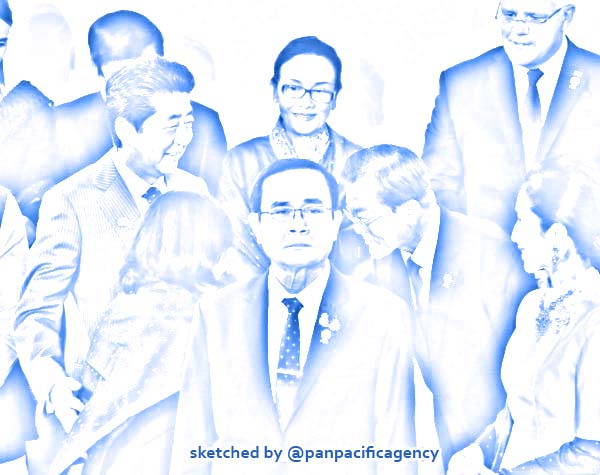Japan, S. Korea leaders hold 1st formal talks in 15 months

ASEAN Chair and Thai Prime Minister Prayuth Chan-ocho looks ahead as Japan's Prime Minsiter Shinzo Abe, South Korea's President Moon Jae-in and others attend a photo session in Bangkok, Thailand, 3 November 2019 (Photo: Reuters/The Yomiuri Shimbun). Sketched by the Pan Pacific Agency.
CHENGDU, Dec 24, 2019, Kyodo. Japanese Prime Minister Shinzo Abe and South Korean President Moon Jae In met Tuesday for their first formal talks in 15 months, amid signs of a nascent thaw in relations strained over wartime labor and trade issues, Kyodo News reported.
The meeting in the southwestern Chinese city of Chengdu is closely watched for any hints on whether the Asian neighbors can break the stalemate and repair ties, at a time when close cooperation is required to cope with North Korean issues.
Earlier in the day, the foreign ministers of Japan and South Korea agreed to maintain dialogue, laying the groundwork for their leaders to meet.
South Korean Foreign Minister Kang Kyung Wha told her Japanese counterpart Toshimitsu Motegi that Seoul hopes to work toward improving bilateral ties through the summit, the Japanese Foreign Ministry said.
Motegi replied that he was glad to be able to talk with Kang “at such an important timing” before the summit. But he also urged South Korea to address the dispute over compensation for wartime labor, according to the ministry.
Both Abe and Moon are in the southwestern Chinese city for a trilateral meeting with Chinese Premier Li Keqiang.
The Japanese and South Korean leaders are expected to exchange views over the issue of wartime labor compensation, which is at the core of the sharp deterioration in bilateral relations.
The previous summit was held in September last year, before South Korean court rulings ordered Japanese firms to compensate people for wartime forced labor during Japan’s 1910-1945 colonial rule of the Korean Peninsula.
With neither side budging on the compensation issue, bilateral ties had sunk to the lowest in years. But a string of developments at the parliamentary and ministerial levels emerged in the lead up to Tuesday’s summit.
Lawmakers in South Korea submitted a bill last week to solicit donations from South Korean and Japanese firms as well as the public to secure funds to be used as compensation for wartime labor.
Japanese and South Korean trade officials held talks over Tokyo’s imposition of tighter export controls that Seoul had viewed as retaliation in the dispute over wartime labor.
Japan eased some of its export controls over three South Korea-bound materials for use in semiconductors and display panels on Friday.
The most recent encounter between Abe and Moon was an 11-minute conversation in November on the occasion of a multilateral meeting in Thailand. They did not hold a bilateral summit on the fringes of the Group of 20 leaders’ gathering in June.
Speaking to reporters ahead of his departure for China, Abe reiterated that South Korea should keep promises made between states. “As I plan to meet with President Moon, I will convey Japan’s stance on the issue of former workers from the Korean Peninsula among others,” Abe said Monday.
Tokyo maintains that the issue of compensation was settled under a 1965 bilateral agreement and it is Seoul that needs to take action because the compensation orders in South Korea are in contravention of the accord. Japan also sought to settle the dispute via an arbitration panel that involves a third country but Seoul did not respond to the request.
South Korea, meanwhile, says its hands are tied because of the separation of powers. Still, Seoul proposed securing funds for compensation through the participation of companies from both nations, including those in the lawsuits, which was rejected by Tokyo.
The bill, submitted to South Korea’s parliament, seeks donations “on a voluntary basis,” which is seen as aimed at addressing concerns in Japan that the Japanese companies will be forced into contributing.
The United States did not wade into the spat between Tokyo and Seoul until the U.S. allies came close to letting a military intelligence sharing pact collapse in November.
The termination of the General Security of Military Information Agreement, seen as useful in countering the North Korean missile threat, was averted after Seoul revisited its decision.